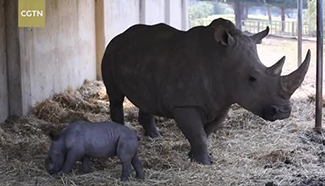XINING, Feb. 8 (Xinhua) -- As Spring Festival finished, Wu Wei and his wife Gao Yaqing finally had a moment of relief after the busiest time of year in their store.
The couple run a pet store in Xining, capital of northwest China's Qinghai Province. They sell pet food, as well as offer grooming and daycare services for pets.
As pets are not allowed on Chinese trains, people leave their pets in daycare over the holidays.
Wu's store became a temporary home for over a dozen pet dogs during the holiday.
"The dogs are like family to me," said Gao, who has three dogs herself.
The couple opened the store in March 2016. The 110-square-meter store is called Naonao's Pet Store, after her pet dog Naonao, which means liveliness in Chinese.
"I hope the store can be a place full of life and energy," Gao said.
For Spring Festival, Wu and Gao served a Chinese traditional meal of dumplings stuffed with chicken, carrots, and cabbage for the dogs.
"I'm very happy seeing my dog enjoy the festival food," said Ning Dinghua, whose dog Dabai stayed at the store.
When sending her there, Ning brought Dabai's own cup, dog food, and snacks. He made daily phone calls to check on her.
"Dabai is very active, and I fear she may run away when taken out for walks," Ning said.
As soon as he returned to Xining, Ning went to pick up Dabai at the store.
"She quickly ran towards me and bounced around joyfully," he recalled.
EMERGING SECTOR
China has over 30,000 pet stores, about three times that of the United States, mostly in large cities, according to market research by the American Pet Products Association.
Like Wu, many pet stores experienced a boom during Spring Festival. Wu charges 40 to 60 yuan per dog, per day. Despite the large number of stores, strong demand in some cities drove up the price.
"A large dog can cost nearly 100 yuan per day (about 14.6 dollars), more expensive than my kid's tuition fee in the kindergarten." read one online post.
In China, keeping pets is a growing trend. The pet dog population in China reached 27.4 million, ranking third in the world after the United States and Brazil, according to official statistics.
The growing pet population has brought new opportunities. The pet care market in China is valued at 97.8 billion yuan, with pet food and snacks, daily supplies and daycare services being the top three segments, according to a 2016 report by China's online pet community goumin.com.
In recent years, daycare provision has expanded beyond pet stores, clinics and daycare centers. Applications for families to find and become registered daycare providers have increased. Xiaogouzaijia, established in mid-2015, now covers 200 Chinese cities with tens of thousands of registered families.
"The booming pet care market reflects people's improved quality of life," said Lin Wenjun, a scholar from Nankai University. "With household income and pet care knowledge increasing, new products and services such as pet smart wearables, grooming and insurance are also emerging."














